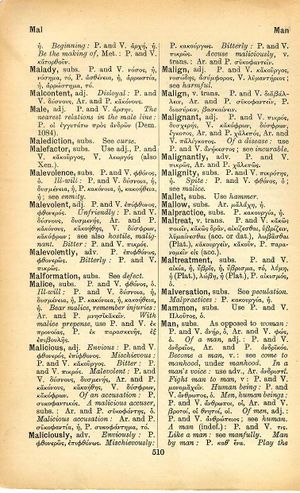malefactor: Difference between revisions
Ὦ ξεῖν’, ἀγγέλλειν Λακεδαιμονίοις ὅτι τῇδε κείμεθα τοῖς κείνων ῥήμασι πειθόμενοι. → Go tell the Spartans, stranger passing by, that here, obedient to their laws, we lie.
m (Text replacement - "(|thumb)\n(\|link=)" to "$1$2") |
m (Woodhouse1 replacement) |
||
| Line 1: | Line 1: | ||
{{Woodhouse1 | {{Woodhouse1 | ||
|Text=[[File:woodhouse_510.jpg|thumb|link={{filepath:woodhouse_510.jpg}}]] | |Text=[[File:woodhouse_510.jpg|thumb|link={{filepath:woodhouse_510.jpg}}]] | ||
Use adj., P. and V. [[κακοῦργος]], V. [[λεωργός]] (also Xen.). | ===substantive=== | ||
Use adj., [[prose|P.]] and [[verse|V.]] [[κακοῦργος]], [[verse|V.]] [[λεωργός]] (also [[Xenophon|Xen.]]). | |||
}} | }} | ||
{{Lewis | {{Lewis | ||
Revision as of 09:19, 20 May 2020
English > Greek (Woodhouse)
substantive
Use adj., P. and V. κακοῦργος, V. λεωργός (also Xen.).
Latin > English (Lewis & Short)
mălĕfactor: ōris, m. id.,
I an evildoer, malefactor (Plautin. and post-class.): malefactorem amitti satiu'st quam relinqui beneficum, i. e. it is better to let a malefactor go unpunished than to be ungrateful towards a benefactor, Plaut. Bacch. 3, 2, 11: ad vindictam malefactorum, Vulg. 1 Pet. 2, 14.
Latin > French (Gaffiot 2016)
mălĕfactŏr,¹⁶ ōris, m., homme malfaisant, malfaiteur : Pl. Bacch. 395 ; Vulg. Joann. 18, 30.
Latin > German (Georges)
malefactor, ōris, m. (malefacio), der Übeltäter, Plaut. Bacch. 395. Vulg. 1. Petr. 2, 12 u. 14.
Latin > English
malefactor malefactoris N M :: malefactor; wrongdoer, evildoer

